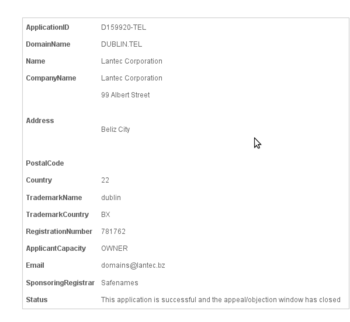During the sunrise period for .eu domains there was quite a bit of controversy, as a number of high profile names were grabbed by companies that had no legitimate right to them.
One of the domains that caught my attention at the time was dublin.eu (see Irish Times article).
So what about the .tel sunrise?
Were companies like Lantec, who grabbed the dublin.eu domain, actively seeking high profile names this time round?
Well the answer is pretty obvious – they were.
Dublin.tel received two applications during the .tel sunrise and the second one was successful.
So Dublin city won’t be able to make use of the domain dublin.tel unless they either buy the domain from Lantec or are successful in a WIPO UDRP.
Whose fault is this?
Telnic’s? No. Their process for validating sunrise applications was clearly followed, so blaming them is pointless. Lantec, like any other sunrise applicant, had to provide trademark information in order to apply for the domain.
ICANN’s? No. They’d nothing to do with it.
Dublin city? That depends on your perspective. They probably should have applied for the domain or made representation to the registry to get the domain name added to the reserve list.

Whilst dot tel is undoubtedly a clever system, they are still asking people to pay a not unsubstantial annual recurring charge indefinitely – when you can currently just use other free online address books, where you can be found via Google on a name search. Most people use Google when they want to find other people.
For instance, you can get a free listing at WikiWorldBook.com which enables you to be easily found via Google, and messaged via the website. You can publish as much or as little of your contact information as you want.
The website’s message gateway allows users to be contacted without having to reveal their email address. After checking any messages for spam, the message system forwards on the messages to the registered user’s email account, so they don’t have to return to the site. Uniquely, the person contacting them doesn’t have to be registered, thus enabling people to reconnect as easily as possible.